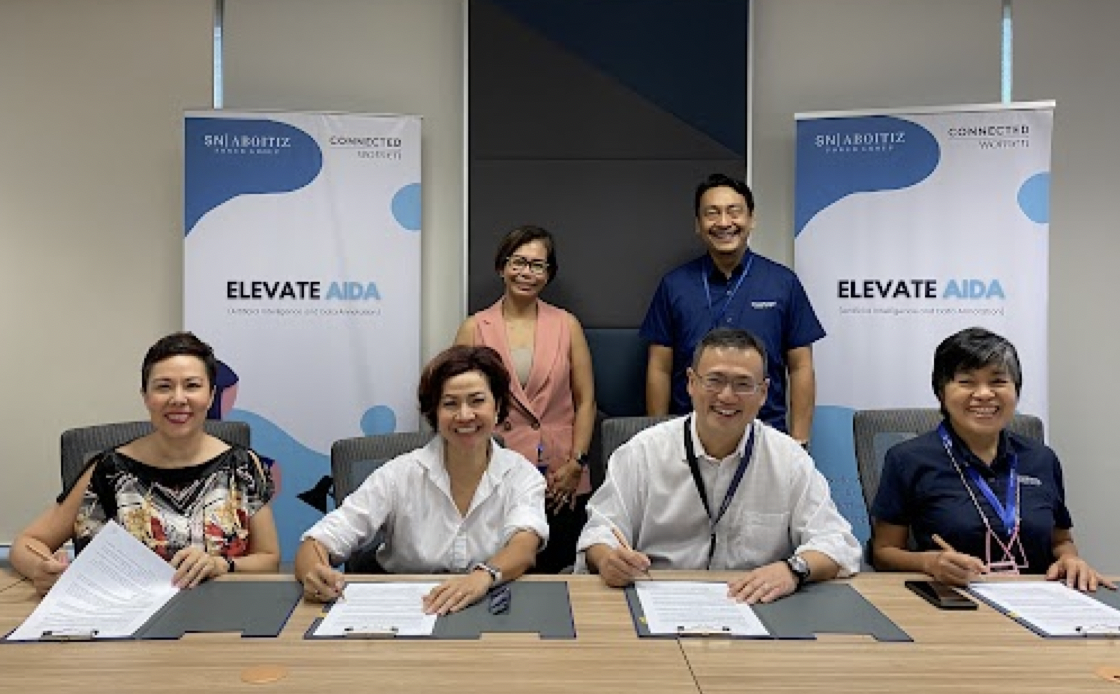SNAP empowers women through sustainable growth
Posted on January 19, 2023
Collaboration is a vital component of sustainability. Companies can only achieve sustainable growth if there is a balance between the three factors in the sustainability equation: people, planet, and profit. And for renewable energy company, SN Aboitiz Power (SNAP), the importance of including their stakeholders was clear from the beginning of their sustainability journey.
Proof of this meaningful collaboration is an initiative between SNAP and Connected Women through its program, Elevate AIDA (Artificial Intelligence Data Annotation). Under this partnership, SNAP and Connected Women will train unemployed home-based women in Artificial Intelligence (AI) and data annotation.
“Sustainable development entails uplifting communities. One great way to do it is by reducing poverty in the community and providing decent work and economic growth, and education is a key part of that. Women will get training, education, and job opportunities through Elevate AIDA,” said Joseph Yu, SNAP President and CEO, in his statement during the Memorandum of Agreement (MOA) signing.
Over the years, SNAP has established and nurtured partnerships with its various stakeholders and encouraged them to play an active role in sustainable development. In this program, women from Namilangan, Alfonso Lista, Ifugao; General Aguinaldo, Ramon Isabela; and Marian, Tinongdan, of Itogon, and Sombrero, Ambuklao of Bokod, Benguet, will have the opportunity to develop online skills and provided with remote work opportunities.
This kind of partnership is important to achieving the scale and sustained impact needed to generate shared value among SNAP’s stakeholders. Programs like this foster mutual understanding, trust, and support that the renewable energy company has committed to building.
“We are continually working on empowering, educating, and uplifting our host communities. By doing so, we are able to find new opportunities to work together and to create new solutions as we forge and energize a sustainable future,” he closed.
SNAP’s operational and sustainability practices are in alignment with and contribute directly to select SDGs, including Affordable and Clean Energy (SDG 7), Climate Action (SDG 13), Occupational Health and Safety (SDG 3), and Community Engagement (SDG 17).
Ruth Yu-Owen, Connected Women Co-Founder believes in a future where AI accelerates innovation with impact and creates accessible opportunities for all. “Through our partnership with SNAP, we provide talent and commercial value to SNAP’s various business units while ensuring that women are not left behind in the future of work,” she said.
Connected Women is a for-profit social impact tech startup offering online skills training and remote work opportunities for women, and providing fully managed high-quality affordable data annotation outsourcing skills for businesses globally.
About SNAP:
SN Aboitiz Power (SNAP) is a joint venture of Scatec and Aboitiz Power Corporation (AP).
Scatec is a leading renewable energy solutions provider, accelerating access to reliable and affordable clean energy in emerging markets. As a long-term player, they develop, build, own and operate renewable energy plants, with 4.6 GW in operation and under construction across four continents today. They are committed to grow our renewable energy capacity, delivered by their 700 passionate employees and partners who are driven by a common vision of ‘Improving our Future’. Scatec is headquartered in Oslo, Norway and listed on the Oslo Stock Exchange under the ticker symbol ‘SCATC’.
AP is the holding company of the Philippines-based Aboitiz Group’s investments in power generation, distribution, and retail electricity services. It advances business and communities by providing reliable and ample power supply at a reasonable and competitive price, and with the least adverse effects on the environment and host communities.
SNAP owns and operates the 105-MW Ambuklao and 140-MW Binga hydroelectric power plants in Benguet; the Magat hydroelectric power plant which has a nameplate capacity of 360 MW and maximum capacity of 388 MW on the border of Isabela and Ifugao; and the 8.5-MW Maris hydro in Isabela. The non-power components such as dams, reservoirs, and spillways are owned, managed, and operated by the government.